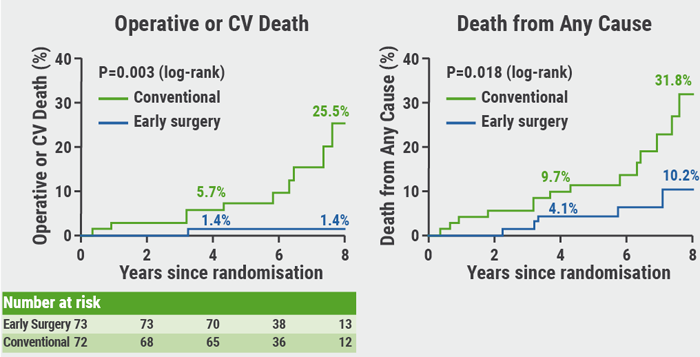As the largest study of its kind, the International Study of Comparative Health Effectiveness with Medical and Invasive Approaches (ISCHEMIA) was one of the most anticipated results at the congress. The investigators randomly assigned 5,179 patients with coronary artery disease at 320 sites in 37 countries to receive 1 of 2 treatment strategies: either ‘invasive’ therapy including early stent implants or bypass surgery, or ‘conservative’ therapy, where patients received only medication (e.g. aspirin, statins) and lifestyle advice.
Prof. Judith Hochman (New York University School of Medicine, USA) presented the results, reporting that over a median follow-up of 3.3 years, there were no differences between the 2 groups in the risk for the primary composite endpoint of time to cardiovascular death, myocardial infarction (MI), or hospitalisation for unstable angina, heart failure, or resuscitated cardiac arrest (HR 0.93; 95% CI 0.80-1.08; P=0.34) [1].
However, the data was slightly more complex, Dr Hochman pointed out, because the curves crossed at 2 years follow-up. At 6 months, the absolute rates favoured the conservative therapy by 1.9%. Yet, at 4 years, the data favoured the patients who had received early angiography prior to percutaneous coronary intervention (PCI) or bypass surgery by 2.2% (13.3% vs 15.5%, respectively). Prof. Hochman underscored that it is unclear what longer follow-up may reveal.
There was no difference between the invasive and conservative strategies in the key secondary endpoints of cardiovascular death or MI (11.7% vs 13.9%; HR 0.90; 95% CI 0.77-1.06; P=0.21) or in all-cause death (6.5% vs 6.4%; HR 1.05; 95% CI 0.83-1.1).
In a parallel quality-of-life study, presented in the same session by Dr John Spertus (Saint Luke's Mid America Heart institute, USA), data showed that revascularisation provided greater relief from angina symptoms than conservative therapy, with 50% of the patients at 1 year reporting no angina symptoms at all, as opposed to just 20% of those in the conservative therapy arm [2].
Although the overall interpretation of this trial was of a neutral outcome, the results suggest that invasive therapy for stable ischaemic heart disease patients needs to be carefully considered in the context of angina burden and background medical therapy, and that optimal coronary revascularisation can be achieved with low procedural complications.
1. Hochman JS, et al. International Study of Comparative Health Effectiveness With Medical and Invasive Approaches: Primary Report of Clinical Outcomes. LBS02, AHA Scientific Sessions 2019, 14-18 November, Philadelphia, USA.
2. Spertus JA, et al. International Study of Comparative Health Effectiveness With Medical and Invasive Approaches: Primary Report of Quality of Life Outcomes. LBS02, AHA Scientific Sessions 2019, 14-18 November, Philadelphia, USA.
Posted on
Previous Article
« Colchicine prevents cardiovascular events Next Article
RECOVERY: Benefit of early surgery in asymptomatic severe aortic stenosis »
« Colchicine prevents cardiovascular events Next Article
RECOVERY: Benefit of early surgery in asymptomatic severe aortic stenosis »
Table of Contents: AHA 2019
Featured articles
New Approaches to CVD Risk Reduction
Phase 3 BETonMACE trial did not meet its primary endpoint
Inclisiran safely halves LDL-Cholesterol
Colchicine prevents cardiovascular events
Interventional Management for Acute Coronary Syndrome
Drop aspirin after 3 months in non-STEMI ACS patients on dual antiplatelet therapy
Immediate coronary angiography after cardiac arrest does not improve survival
Complete revascularisation for obstructive non-culprit lesions with vulnerable plaque
Colchicine: no difference in peri-procedural cardiovascular events 30 days post-PCI
Intra-aortic balloon pump better than Impella: new observational data
Results for the Ischemia Trials: To Intervene or Not to Intervene
ISCHEMIA trial: Invasive treatment only better for angina burden
Controversies in Contemporary Management of Aortic Stenosis
Full GALILEO results: Why did rivaroxaban fail after TAVR?
Balloon-expandable better than self-expanding transcatheter heart valves
RECOVERY: Benefit of early surgery in asymptomatic severe aortic stenosis
Guidelines: Updates and Controversies
New guidelines on the prevention of cardiovascular conditions
Trials in Electrophysiology and Left Ventricular Function
RENAL-AF trial: Apixaban similar to warfarin
Apple Heart Study: Not just for atrial fibrillation
Early apixaban safe as secondary prevention of stroke from AF
Carvedilol does not improve exercise performance in Fontan patients
New Frontiers in Lipid Therapy
Icosapent ethyl plus statins reduces total plaque volume
ORION-9: Inclisiran RNAi halves LDL in familial hypercholesterolaemia patients
New RNAi therapies to reduce triglycerides: 2 studies show favourable results
Targeting LDL-C <70 mg/dL is better than 100 mg/dL after stroke
Challenges in Heart Failure Management
FUEL trial: Udenafil improves some exercise measurements in Fontan
DAPA-HF: Dapagliflozin also good for heart failure patients without diabetes, of any age, or any health status
PARAGON-HF: Benefits for women and lower ejection fraction
Related Articles
February 26, 2020
Targeting LDL-C <70 mg/dL is better than 100 mg/dL after stroke

© 2024 Medicom Medical Publishers. All rights reserved. Terms and Conditions | Privacy Policy
HEAD OFFICE
Laarderhoogtweg 25
1101 EB Amsterdam
The Netherlands
T: +31 85 4012 560
E: publishers@medicom-publishers.com

